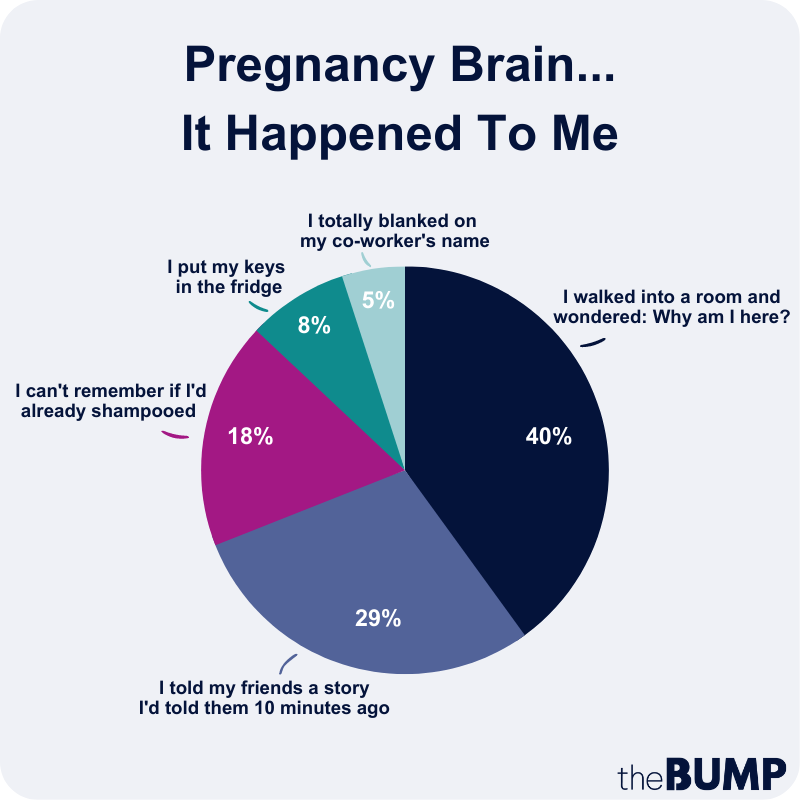Is Pregnancy Brain Real?
Are you finding your house keys in the freezer, forgetting your spouse’s first name and losing your purse on the short trip from your front door to your car? Chalk it up to textbook pregnancy brain.
While pregnancy symptoms like breast tenderness, bloating and morning sickness might be discussed more often, the truth is that pregnancy really can affect your cognition—sometimes in pretty noticeable ways. In fact, 50 to 80 percent of pregnant women report memory and thinking problems, according to the American Psychological Association (APA).
It’s not just the stress of pregnancy, and it’s certainly not your imagination: Pregnancy brain is real. Read on to learn what causes it—and how to feel just a little sharper while expecting.
During pregnancy, you might become more forgetful about things like appointments, lose stuff more often or find yourself unable to concentrate on tasks. This—completely normal and temporary—phenomenon is also sometimes called “mom brain” or “baby brain.”
Yes! People often assume that expectant moms are just distracted or stressed, but research shows that a pregnant person’s brain actually undergoes major changes. These changes are caused by increases in hormones like estrogen and progesterone, and can cause behavioral, mood and cognition shifts.
“There have been multiple studies that have objectively documented that pregnant people have higher rates of impaired cognitive function, memory and executive functioning, the type of functioning needed to tackle complex, multi-step tasks,” says Taniqua Miller, MD, FACOG, an Atlanta-based ob-gyn.
Does Your Brain Shrink During Pregnancy?
Your brain doesn’t actually shrink during pregnancy, but it seems likely that certain parts of it decrease in mass. A 2016 study, for example, found that gray matter areas of the brain related to social cognition were smaller in women who had given birth than in men who had become fathers and women who had never given birth.
The study suggests these changes may serve to help women adapt to new motherhood. Interestingly, though, research has also found that there was still less gray matter when participants were studied six years after giving birth. Researchers have even suggested that pregnancy brain could make you a better parent, creating the pathways needed to teach parents to focus on and care for their children.
Pregnancy brain can start as early as the first trimester, says Miller. This is because progesterone, one of the hormones that causes brain changes during pregnancy, rises quickly in the beginning of pregnancy.
The biggest culprit is the surge in hormones such as estrogen and progesterone. Miller says that while progesterone is critical for the success of pregnancy, encouraging uterine relaxation and placental growth, it can also cause drowsiness, contributing to fatigue and impairing focus, attention and concentration. But while hormones are the major players, there are other contributing factors, says Alyssa Dweck, MS, MD, FACOG, an ob-gyn in Westchester County, New York, and medical advisor for Intimina, like changes to the chemical neurotransmitters in the brain, emotional intensity and stress, and physical changes like overall increased blood volume.
One other major cause? Lack of sleep or poor sleep during pregnancy. “We know that physiologically, towards the end of pregnancy people generally get less REM sleep,” says Miller. “While sleep duration may be the same—or not, considering the nightly interruptions to use the restroom or perhaps other physical discomforts—the amount of time spent in the restorative part of sleep decreases, [which can] compound the symptoms of brain fog.”
Everyone experiences pregnancy brain differently, but Dweck says the most common symptoms include mental fogginess, memory issues, trouble concentrating and forgetfulness.
Miller adds that some pregnant people also start daydreaming more. (Which could explain why you might be bumping into things more these days!)
We’d love to tell you that you’ll be able to kiss pregnancy brain fog good-bye as soon as baby makes their appearance, but the reality is that the postpartum period brings its own hormonal changes, emotional stress and sleepless nights. Still, you’ll gradually find yourself feeling more mentally “with it” as time goes on.
“[Pregnancy brain] is temporary,” says Miller. “As hormonal levels equilibrate after delivery and menstrual cycles return, the pregnancy brain will get better.”
In the meantime, there are a few ways to deal with pregnancy brain while you wait to meet baby.
- Take time to rest. It’s a no-brainer (pun intended), but make sure you give yourself plenty of opportunities to relax both mentally and physically, Miller suggests.
- Leave yourself reminders. Both Dweck and Miller suggest getting one step ahead of your forgetfulness: Make checklists for necessary tasks, set reminders for important events or appointments on your phone and stick visual reminders all over the house if you need them.
- Set the stage for a good night’s sleep. Keep your bedroom at a cool temperature, avoid caffeine late in the day, avoid screen time just before bed and practice mindfulness, advises Dweck. Another sleep tip? Take naps. “A daytime nap may help with the reset needed to feel fresh,” adds Miller.
- Nourish your body. In addition to eating plenty of healthy foods, Dweck says it’s important to hydrate and take a prenatal vitamin with brain-boosting DHA.
- Be kind to yourself. You’ve got a ton of stuff going on, mentally and physically, plus a lot of new responsibilities, says Miller. (That nursery isn’t going to decorate itself.) Pregnancy brain is frustrating, but it’s not your fault—it’s just one more way your body is preparing to welcome your little one into the world. “Give yourself grace,” Miller says.
The bottom line is, yes, pregnancy brain is a real thing. But it’s completely normal—and might even be good for you down the road. In the meantime, there are steps you can take to care for yourself and feel more on top of things.
Please note: The Bump and the materials and information it contains are not intended to, and do not constitute, medical or other health advice or diagnosis and should not be used as such. You should always consult with a qualified physician or health professional about your specific circumstances.
Plus, more from The Bump:
Alyssa Dweck, MS, MD, FACOG, is an ob-gyn in Westchester County, New York. She’s also the coauthor of The Complete A to Z for Your V and is a sexual health and reproductive expert for Intimina, a brand of products focused on women's intimate health. She earned her medical degree from Hahnemann University School of Medicine in Philadelphia.
Taniqua Miller, MD, FACOG, NCMP, is an Atlanta-based ob-gyn and national certified menopause practitioner. She’s also a life coach for professional women of color. She earned her medical degree from Harvard Medical School.
American Psychological Association, Priming for a New Role, 2008
Handbook of Clinical Neurology, Neurophysiological and Cognitive Changes in Pregnancy, 2020
Nature Neuroscience, Pregnancy Leads to Long-Lasting Changes in Human Brain Structure, December 2016
Brain Sciences, Do Pregnancy-Induced Brain Changes Reverse? The Brain of a Mother 6 Years After Parturition, January 2021
Navigate forward to interact with the calendar and select a date. Press the question mark key to get the keyboard shortcuts for changing dates.























































